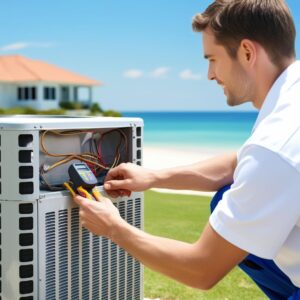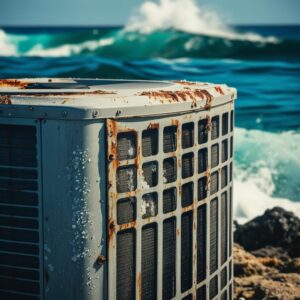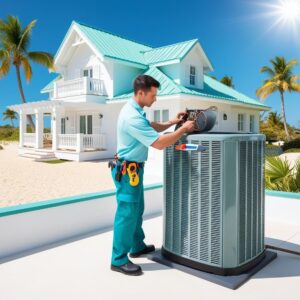Living near the coast is amazing. Ocean views, salty breezes, and that constant vacation vibe. But there’s a hidden cost—your air conditioning system is taking a beating. If you live in Stuart, FL, or anywhere near the coast, your HVAC system is under attack. By what? One word: salt.
Salt is ruthless. It corrodes, it eats away at metal, and it can slash the lifespan of your AC in half if you’re not careful. And if your AC dies in the middle of a Florida summer? That’s not just uncomfortable—it’s brutal.
So, let’s talk about how coastal living affects your AC, how salt damage happens, and, most importantly, how to fight back and protect your system. Because replacing an AC isn’t cheap, but maintaining it properly? That’s how you win.

The Salt Factor: Why Coastal Air is Destroying Your AC
If you’re within 10 miles of the coast, salt is constantly in the air. You don’t see it, but it’s there—especially when the wind kicks up or after a storm. That salty mist settles on everything, including your AC unit. Over time, it starts breaking down metal parts, eating away at coils, and causing corrosion; the silent killer of HVAC systems.
Here’s what’s happening inside your AC:
- Coils corrode faster. The outdoor coils are responsible for releasing heat from your home. Salt buildup accelerates corrosion, making them less efficient and forcing your AC to work harder.
- Electrical components rust. Your AC isn’t just metal—it has wiring and circuits. When salt creeps in, it can damage connections, leading to failures and costly repairs.
- Fans and motors degrade. Moving parts like fans and motors don’t like salt, either. Corrosion leads to friction, slower operation, and ultimately breakdowns.
And guess what? You won’t even notice the damage at first. Your AC will just start losing efficiency. Your energy bill will creep up. You’ll feel less cool air. Then one day—boom. The system fails. And now you’re looking at thousands of dollars to replace it.
But it doesn’t have to be this way. There are simple, effective steps to prevent salt damage and keep your AC running for years.

How to Protect Your AC from Salt Damage
If you live near the coast, your AC requires extra care. The good news? Preventing salt damage is way cheaper than replacing your entire unit. Here’s exactly what you need to do:
1. Wash Your AC Unit Regularly
Your AC sits outside, collecting salt every single day. The easiest way to stop salt buildup? Rinse it down.
- Use a garden hose (not a pressure washer) to spray off your outdoor unit once a month.
- Do this more often if you’re right on the coast.
- This removes salt before it has a chance to cause corrosion.
2. Apply a Protective Coating
There are anti-corrosion coatings designed specifically for HVAC units. These create a barrier between the salt air and your AC’s metal parts.
- Ask your HVAC contractor to apply a corrosion-resistant coating to the coils.
- Some manufacturers offer pre-coated units designed for coastal environments.
It’s a small investment that adds years to your system’s life.
3. Use a Protective Cover During the Off-Season
If you have a vacation home or don’t use your AC year-round, a cover can protect it from constant salt exposure.
- Make sure it’s breathable, trapping moisture can cause other issues.
- Only use it when the AC is off for extended periods.
4. Schedule Professional Maintenance Twice a Year
Regular maintenance is non-negotiable if you live near the coast.
- Have a professional clean and inspect your AC every six months.
- They’ll catch early signs of corrosion and fix small problems before they become big ones.
- They can also check refrigerant levels, clean coils, and ensure everything runs efficiently.
5. Install a Coastal-Specific AC Unit
If you’re due for a replacement, don’t just buy any AC.
- Some brands offer units designed to withstand coastal conditions.
- Look for models with aluminum coils instead of copper (aluminum resists salt corrosion better).
- Choose a unit with a sealed cabinet to protect internal components.
Spending a little extra upfront can save you thousands down the road.
6. Improve Airflow Around the Unit
Good airflow helps reduce salt buildup.
- Keep plants, furniture, and debris at least two feet away from the unit.
- Trim bushes or anything blocking ventilation.
- If possible, install the unit on an elevated platform to reduce direct exposure to ground-level salt spray.
7. Consider Relocating the Unit
If your AC is in a high-exposure area—like directly facing the ocean—you might want to move it.
- Installing it on the side of your home instead of the back can help reduce direct salt contact.
- Talk to an HVAC professional about the best location.
The Bottom Line: Stay Ahead of Salt Damage
Salt damage isn’t a possibility—it’s a guarantee if you live near the coast and don’t take action. The good news? You can fight back. Rinsing your AC, applying coatings, scheduling maintenance, and choosing the right unit all add years to your system’s life.
Most people ignore these steps until their AC dies. Then they panic, spend thousands, and wonder what went wrong. You’re smarter than that.
Take a few small steps now, and you’ll avoid massive headaches (and costs) later. Your AC will run longer, cooler, and cheaper.
Need expert help? Air Plus has been protecting coastal AC systems in Stuart, FL, for years. We know how to keep your AC running efficiently despite the salt air. Call us today for a maintenance checkup, protective coatings, or expert advice on the best AC for your home, or contact us online here.
Because when it comes to coastal living, staying cool isn’t a luxury; it’s a necessity. And we make sure you stay ahead of the game. Let’s win against salt damage together.

